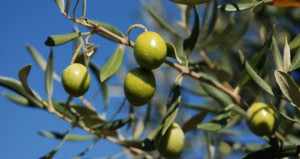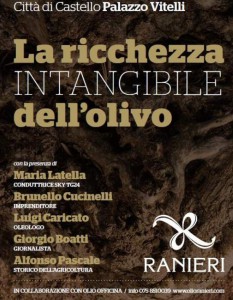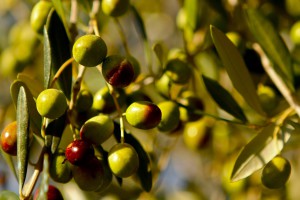by Jessika Pini
The two key lines that emerged from the conference, “The intangible richness of the olive tree”,  was to revive the Italian oil industry, starting from spreading the culture of extra virgin olive oil among consumers and with investments in new production facilities. The conference, organized by the Ranieri oil company in Città di Castello (Perugia), brought together the various producers of the agricultural, industrial and commercial sector, with the aim of structuring and seeking synergy to bring together the components of the sector.
was to revive the Italian oil industry, starting from spreading the culture of extra virgin olive oil among consumers and with investments in new production facilities. The conference, organized by the Ranieri oil company in Città di Castello (Perugia), brought together the various producers of the agricultural, industrial and commercial sector, with the aim of structuring and seeking synergy to bring together the components of the sector.
In the last twenty years in Italy 3 million olive trees were planted compared to the 30 million that were placed in Spain and the 19 million planted in Greece. Domestic production does not cover regular domestic demand, which stands at around 600 thousand tonnes of olive oil / year, in addition to the 400,000 tonnes used for export; plus the disastrous performance of the 2014/2015 marketing year has brought a further reduction of the production to 300,000 tonnes. Therefore 7 out of 10 bottles of oil are made from non Italian olives.
Having to face this difficult situation which is affecting not only farmers, but also the transformation and the trade, the industry has established that the 32 million euros of the national plan will entirely go towards the production phase. How to use this has to be decided and on this point the positions are divided.
Trade and industry, represented by Federolio and Assitol agree that the 32 million euros should be invested to increase production at lower costs. President of Federolio, Giuseppe Masturzo, adds: “With the super-intensive method, combined with appropriate varieties, Italy will get to produce at even lower costs than Spain with the added value that our microclimate can give olives and then oil in organoleptic terms.  We may in this way be able to segment the market with an oil at an average price derived from the olive groves and a premium product derived from PDO and PGI that would also ensure the conservation of varieties biodiversity”.
We may in this way be able to segment the market with an oil at an average price derived from the olive groves and a premium product derived from PDO and PGI that would also ensure the conservation of varieties biodiversity”.
Luigi Canino, President of Unasco (National Union of the olive producers) has defined the funds available "a drop in a bucket when you consider that only to achieve the necessary facilities to produce 200,000 tonnes of oil arriving to cover more or less the national demand, 2 billion would be necessary. In addition we can’t take Spain as an example because Italy has other features: the convenience of the intensive method should be discussed, considering that most of the Italian territory is in less-favoured areas”.
